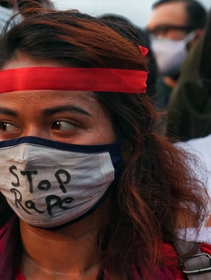
Will a law punishing sexual violence with death solve Bangladesh’s rape epidemic?
Bangladesh adopts the death penalty as punishment for rape following widespread protests, but other solutions to systemic sexual violence are needed.
Iqbal Hossain
I was born in Dhaka, Bangladesh in 1984. In 1994, photographer Dr. Shahidul Alam of the Drik Picture Library gave me a camera to start taking photographs from a child’s point of view. That was the beginning of my work as a photographer.
In 1997, through Drik I met Jeremy Seabrook, who was working on a book on child labour, “Children of other worlds” (Pluto Press, London, 1999). I was his guide for several months in Dhaka, visiting the places where children worked, and translating interviews for him.
In recent years I’ve worked as a freelance photojournalist, including for the New Internationalist, The Daily Star, UNICEF, A&G Italia, UNFPA Bangladesh, Save The Children, Southampton University, Oxfam Bangladesh, Amnesty Italia, Drik Picture Library, Ekushey Television, World View International, Young Asia TV, BRAC, Carers Worldwide UK, CRP Bangladesh, Panos South Asia, Chobi Mela, the Danish Centre for Culture & Development and others.
My principal interest is in documentary photography and reporting.
FAVOURITE QUOTE
“A journey of a thousand miles starts right at your feet” (Chinese proverb)
Bangladesh adopts the death penalty as punishment for rape following widespread protests, but other solutions to systemic sexual violence are needed.
Protests against extradjudicial killings at the hands of police were attacked, further propagating a climate of impunity and fear in Bangladesh.
Bangladesh suffered widespread damage as a result of Cyclone Amphan. Yet the Sundarbans mangrove forest acted as a natural barrier protecting the country from further destruction, as it has done countless times before.
The government believes it’s on the right track to addressing the coronavirus in Bangladesh. But millions don’t have enough food and as most hospitals refuse patients with a fever and cough, the poor are dying.